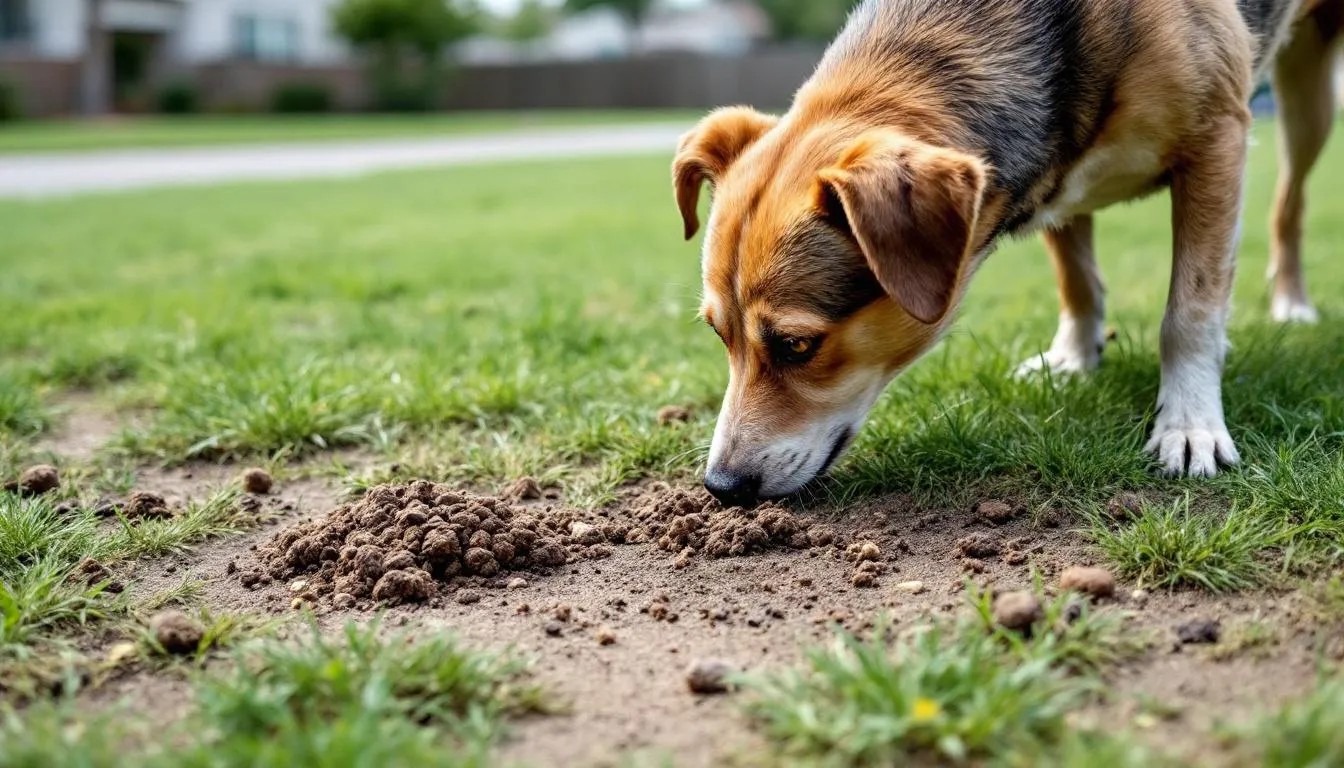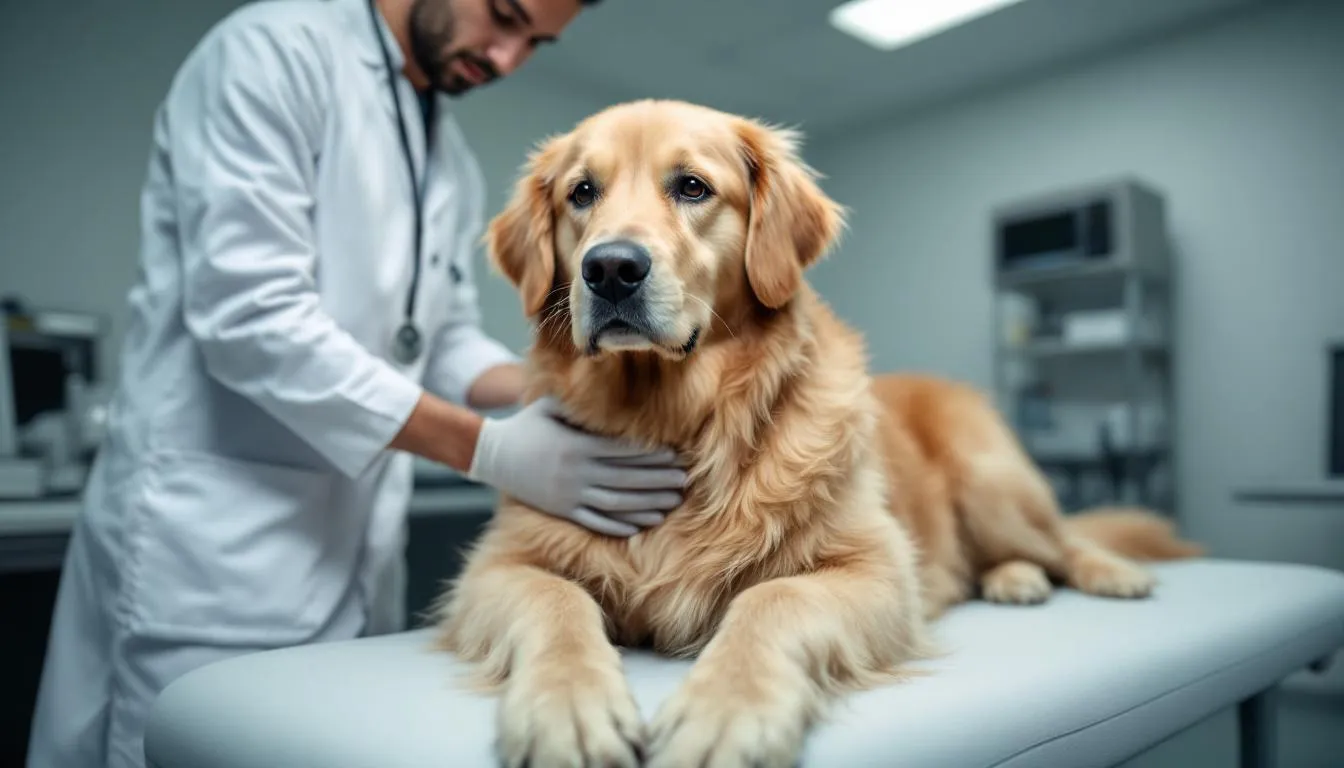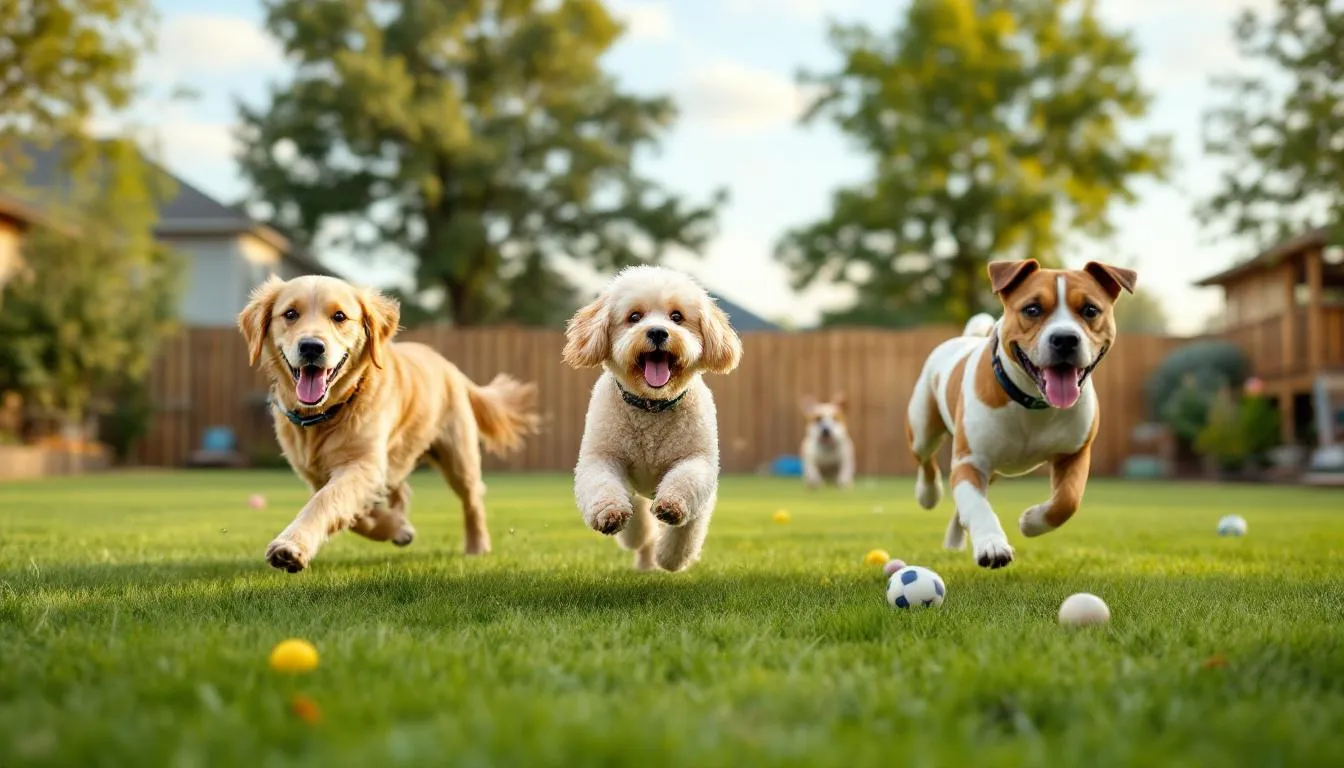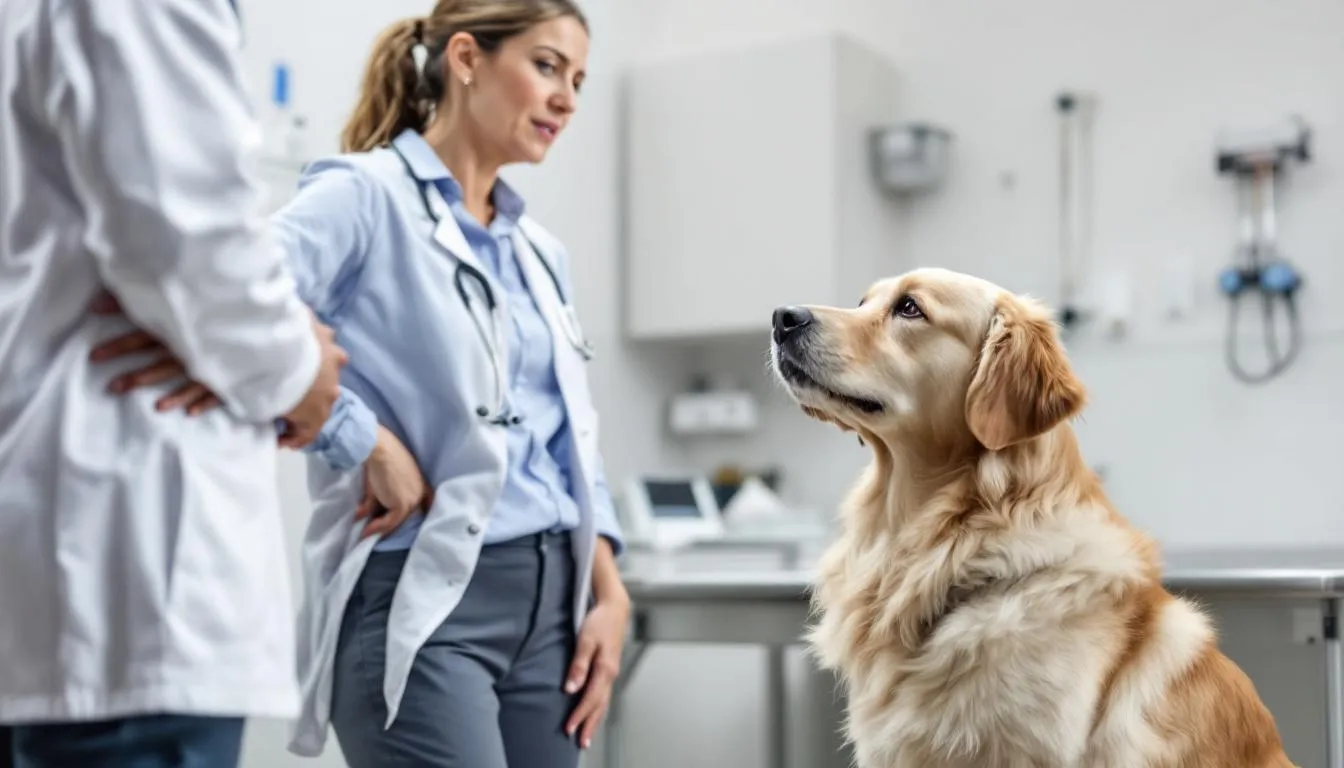Key Takeaways
- Coprophagia (poop eating) affects approximately one in six dogs and is considered normal canine behavior by veterinarians
- Dogs eat poop due to natural instincts, nutritional deficiencies, medical conditions, anxiety, or attention-seeking behaviors
- While eating their own poop is typically harmless, consuming other animals’ feces can expose dogs to parasites and diseases
- Prevention strategies include immediate cleanup, positive reinforcement training, dietary supplements, and addressing underlying health issues
- Sudden onset of poop eating in an adult dog warrants veterinary examination to rule out medical causes
Coprophagia (poop eating) affects approximately one in six dogs and is considered normal canine behavior by veterinarians
Dogs eat poop due to natural instincts, nutritional deficiencies, medical conditions, anxiety, or attention-seeking behaviors
While eating their own poop is typically harmless, consuming other animals’ feces can expose dogs to parasites and diseases
Prevention strategies include immediate cleanup, positive reinforcement training, dietary supplements, and addressing underlying health issues
Sudden onset of poop eating in an adult dog warrants veterinary examination to rule out medical causes


What Is Coprophagia and Is It Normal?
Discovering your dog eating poop can be both disgusting and concerning for pet parents. However, this behavior—scientifically known as coprophagia—is far more common than most dog owners realize. Research conducted by veterinary behaviorists reveals that approximately one in six dogs regularly engage in this behavior, with about 24% of dogs observed eating feces at least once in their lifetime.
Veterinarians and animal behaviorists consider coprophagia a normal behavior in canines, even though it may seem revolting to humans. The behavior stems from evolutionary adaptations that helped wild canids survive and protect their pack members from threats. There are several reasons why a dog eat feces, including behavioral, medical, and environmental factors that influence this habit.
There are two distinct types of coprophagia that dogs engage in:
- Autocoprophagia : When dogs eat their own poop
- Allocoprophagia : When dogs eat feces from other animals or other dogs
Autocoprophagia : When dogs eat their own poop
Allocoprophagia : When dogs eat feces from other animals or other dogs
While many undesirable actions can occur in pets, eating poop is one behavior that may be linked to underlying health concerns or nutritional deficiencies, making it important to consult a veterinarian if it becomes frequent.
Understanding this distinction is crucial because eating their own feces is generally harmless to healthy dogs, while consuming other animals’ waste can expose them to intestinal parasites, bacteria, viruses, and other diseases. The health risks increase significantly when dogs eat feces from cats, wild animals, or livestock like horses.
Natural and Instinctual Reasons Dogs Eat Poop
Maternal Behavior and Nursing
One of the most natural and important reasons dogs eat poop relates to maternal instincts. Mother dogs instinctively consume their puppies’ feces during the first three weeks of nursing to maintain den hygiene and protect their vulnerable offspring.
This behavior serves multiple evolutionary purposes:
- Keeps the nursing area clean and odor-free
- Prevents attracting predators to the den through scent trails
- Reduces disease transmission within the litter
- Stimulates proper elimination in newborn puppies
Keeps the nursing area clean and odor-free
Prevents attracting predators to the den through scent trails
Reduces disease transmission within the litter
Stimulates proper elimination in newborn puppies
Most mother dogs naturally stop this behavior as puppies become more mobile and begin eating solid dog food around three to four weeks of age. However, some puppies may observe and learn this behavior from their mothers, particularly if they continue nursing longer than typical.
Ancestral Scavenging Instincts
Dogs evolved from wild canids like wolves, who developed poop eating as a survival mechanism over thousands of years. In the wild, fresh poop consumption helped prevent intestinal parasites from establishing in pack members, since fresher feces contain fewer infectious parasite stages compared to older, decomposed waste.
Wild canids also used poop eating to:
- Remove scent trails that could attract predators to the pack
- Access any remaining nutrients during periods of food scarcity
- Maintain pack hygiene in shared living spaces
- Signal submission and pack hierarchy
Remove scent trails that could attract predators to the pack
Access any remaining nutrients during periods of food scarcity
Maintain pack hygiene in shared living spaces
Signal submission and pack hierarchy
These ancestral behaviors remain deeply embedded in why do dogs eat poop along with the dogs’ instincts, explaining why even well-fed pets may still engage in coprophagia. Dogs evolved as opportunistic scavengers, and what humans find disgusting, dogs perceive as a potentially valuable resource.
Taste and Nutritional Appeal
From a dog’s perspective, feces can be genuinely appealing due to undigested nutrients remaining from incomplete digestion. Dogs have significantly enhanced smell capabilities compared to humans, making them acutely aware of food particles and nutrients present in waste.
Particularly attractive to many dogs are:
- Cat poop : Often contains high protein levels from cats’ meat-based diets
- Horse manure : Rich in partially digested grasses and grains
- Other dogs’ feces : Especially from dogs eating different or higher-quality dog food
- Fresh poop : More appealing than older waste due to stronger scent and softer texture
Cat poop : Often contains high protein levels from cats’ meat-based diets
Horse manure : Rich in partially digested grasses and grains
Other dogs’ feces : Especially from dogs eating different or higher-quality dog food
Fresh poop : More appealing than older waste due to stronger scent and softer texture
Some dogs show seasonal preferences, finding frozen poop especially enticing during winter months. This behavior often intensifies in multi-pet households where dogs can access a variety of different animals’ waste products.


Medical and Health-Related Causes
While modern commercial dog foods are generally nutritionally complete, certain deficiencies can trigger poop eating behavior in some dogs. Vitamin B deficiency is particularly significant because fecal microbes synthesize B vitamins, making poop an attractive source for dogs lacking these essential nutrients.
Nutritional Deficiencies
Other nutritional factors that may contribute to coprophagia include:
- Enzyme deficiencies : Modern high-carbohydrate diets differ significantly from ancestral meat-based nutrition, potentially creating digestive enzyme insufficiencies
- Insufficient feeding : Dogs receiving inadequate calories may seek additional nutrition from any available source
- Unbalanced diets : Poor-quality dog food lacking essential nutrients can drive nutrient-seeking behaviors
- Missing nutrients : Deficiencies in specific vitamins or minerals may trigger scavenging instincts
Enzyme deficiencies : Modern high-carbohydrate diets differ significantly from ancestral meat-based nutrition, potentially creating digestive enzyme insufficiencies
Insufficient feeding : Dogs receiving inadequate calories may seek additional nutrition from any available source
Unbalanced diets : Poor-quality dog food lacking essential nutrients can drive nutrient-seeking behaviors
Missing nutrients : Deficiencies in specific vitamins or minerals may trigger scavenging instincts
Pet parents should consult with their veterinarian about appropriate dietary supplements, multivitamins, or enzyme supplements if nutritional deficiencies are suspected. However, most dogs eating high-quality, balanced diets do not develop coprophagia due to nutritional reasons alone.
Underlying Medical Conditions
Several medical conditions can increase appetite or interfere with proper nutrient absorption, leading to increased poop eating behavior:
Metabolic disorders such as diabetes or thyroid disease can cause excessive hunger, making dogs more likely to eat anything that smells like food, including feces. Dogs taking steroid medications often experience similar increased appetite effects.
Gastrointestinal problems including inflammatory bowel disease, malabsorption syndromes, or pancreatic insufficiency can prevent proper nutrient absorption, driving dogs to seek additional nutrition sources.
Intestinal parasites are particularly concerning because they can both cause and result from poop eating. Parasites interfere with normal digestion while also being transmitted through contaminated feces.
Warning signs requiring immediate veterinary attention include:
- Sudden onset of poop eating in previously normal adult dogs
- Weight loss despite normal or increased appetite
- Persistent vomiting or diarrhea
- Changes in stool consistency, color, or frequency
- Lethargy or decreased activity levels
Sudden onset of poop eating in previously normal adult dogs
Weight loss despite normal or increased appetite
Persistent vomiting or diarrhea
Changes in stool consistency, color, or frequency
Lethargy or decreased activity levels
Early veterinary intervention can identify and treat underlying medical problems before they become serious health issues.
Behavioral and Psychological Causes
Anxiety and Stress
Environmental stressors significantly contribute to poop eating behavior in many dogs. Dogs confined to small spaces, isolated in basements or kennels, or living in overcrowded shelter conditions show higher rates of coprophagia compared to dogs with adequate space and mental stimulation.
Separation anxiety particularly affects dogs who spend long periods alone without adequate environmental enrichment. These dogs may develop coprophagia as a displacement behavior—a self-soothing mechanism to cope with stress and boredom.
Boredom dogs often seek entertainment through inappropriate behaviors when their mental and physical needs aren’t met. Unsupervised dogs may discover that poop eating provides sensory stimulation and becomes a habitual activity.
Attention-Seeking Behavior
Puppies naturally explore their environment through taste and smell, and many discover that eating poop generates strong reactions from pet parents. Even negative attention like yelling “drop it” or chasing the dog can reinforce the behavior because dogs interpret any attention as reward.
This attention-seeking pattern often develops when:
- Owners react dramatically to initial poop eating incidents
- Puppies learn that coprophagia reliably gets human attention
- Dogs receive more attention for bad behavior than good behavior
- The behavior becomes an established attention-getting strategy
Owners react dramatically to initial poop eating incidents
Puppies learn that coprophagia reliably gets human attention
Dogs receive more attention for bad behavior than good behavior
The behavior becomes an established attention-getting strategy
Breaking this cycle requires pet parents to avoid giving attention to poop eating while consistently rewarding good behavior with positive reinforcement.
Fear of Punishment
Dogs who have experienced harsh punishment during potty training may eat their own poop to hide evidence of indoor accidents. This creates a problematic cycle where punishment actually encourages the behavior it’s meant to stop.
Fear-based poop eating often develops when:
- Dogs are severely punished for house training accidents
- Dogs associate elimination with potential punishment
- Dogs become secretive about normal bodily functions
- Punishment increases rather than decreases the unwanted behavior
Dogs are severely punished for house training accidents
Dogs associate elimination with potential punishment
Dogs become secretive about normal bodily functions
Punishment increases rather than decreases the unwanted behavior
Understanding this connection helps explain why positive reinforcement training methods are more effective than punishment-based approaches for addressing coprophagia.
Boredom and Curiosity
Young puppies naturally investigate everything in their environment, including feces. Most puppies outgrow this exploratory phase by nine months of age if the behavior isn’t inadvertently reinforced by owner reactions.
However, dogs lacking adequate mental stimulation may continue using poop eating as entertainment well into adulthood. This particularly affects intelligent breeds who need regular mental challenges to prevent destructive or inappropriate behaviors.


Environmental and Social Factors
Living with multiple pets creates unique dynamics that can encourage poop eating behavior. Healthy dogs may eat feces from sick or elderly housemates as a form of pack protection, attempting to clean up messes and maintain group hygiene.
Multi-Pet Households
Competition for resources in multi-pet households can also drive coprophagia, as dogs may consume anything that appears food-related before other pets can access it. This behavior can spread between animals, with one dog’s poop eating encouraging similar behavior in other household pets.
Inappropriate Food Associations
Environmental factors that create positive associations with feces can encourage coprophagia:
- Feeding near elimination areas : Dogs may confuse scents and locations
- Mother’s breath during nursing : Puppies may smell fecal residue mixed with food odors on their mother's breath, especially if the mother’s breath is contaminated with fecal odors or regurgitated food. This early exposure can create positive associations with the smell or taste of poop, potentially influencing future behavior related to fecal matter.
- Regurgitated food : Young puppies may encounter partially digested food that resembles feces
- Outdoor feeding : Food bowls near areas where animals eliminate can create confusion
Feeding near elimination areas : Dogs may confuse scents and locations
Mother’s breath during nursing : Puppies may smell fecal residue mixed with food odors on their mother's breath, especially if the mother’s breath is contaminated with fecal odors or regurgitated food. This early exposure can create positive associations with the smell or taste of poop, potentially influencing future behavior related to fecal matter.
Regurgitated food : Young puppies may encounter partially digested food that resembles feces
Outdoor feeding : Food bowls near areas where animals eliminate can create confusion
Preventing these associations requires careful attention to feeding locations and maintaining separation between food and elimination areas.
How to Stop Dogs From Eating Poop
Environmental Management
The most effective immediate strategy to stop dogs from eating poop involves removing access to feces entirely. Pet parents should prioritize immediate cleanup of all waste from yards, walking areas, and indoor spaces.
Practical environmental management steps include:
- Supervised outdoor time : Always accompany dogs during potty breaks and walks
- Immediate cleanup : Remove feces within minutes of elimination
- Secure litter boxes : Keep cat litter boxes in areas inaccessible to dogs
- Pet gates : Use barriers to limit access to elimination areas
- Crate training : Prevent unsupervised access when owners cannot directly monitor
Supervised outdoor time : Always accompany dogs during potty breaks and walks
Immediate cleanup : Remove feces within minutes of elimination
Secure litter boxes : Keep cat litter boxes in areas inaccessible to dogs
Pet gates : Use barriers to limit access to elimination areas
Crate training : Prevent unsupervised access when owners cannot directly monitor
Consistency is crucial—even occasional access to feces can maintain the behavior and undermine training efforts.
Training and Behavior Modification
Successful behavior modification requires patient, positive training methods that redirect dogs’ attention away from feces toward more appropriate behaviors.
Essential training commands include:
“Leave it” command : Teach dogs to ignore feces on command using high-value treats and consistent practice. Start with less tempting items and gradually work up to practicing near actual feces.
“Come” command : Ensure reliable recall so dogs return immediately when called away from feces. Use particularly tasty treats or special toys that only appear during training sessions.
Positive reinforcement timing : Immediately reward dogs for eliminating without eating their waste. Keep treats readily available during all outdoor time to mark good behavior instantly.
Avoid punishment-based methods, which can increase anxiety and actually worsen poop eating behavior. Instead, focus on making appropriate behaviors more rewarding than coprophagia.
Dietary Solutions and Supplements
Various supplements and dietary modifications can help discourage poop eating by making feces less appealing or addressing underlying nutritional needs:
Commercial coprophagic supplements containing monosodium glutamate, chamomile, and pepper derivatives can make feces taste unpleasant. However, scientific evidence for effectiveness varies, and all pets in the household must consume supplements for optimal results.
Digestive enzyme supplements including papain can improve nutrient absorption, potentially reducing nutritional drives for coprophagia. These supplements may be particularly helpful for dogs with pancreatic insufficiency or other digestive disorders.
Multivitamins and B-vitamin supplements can address potential nutritional deficiencies that might contribute to poop eating. Consult with a veterinarian before adding supplements to ensure they’re appropriate for your dog’s specific needs.
Probiotics support overall gut health and may improve digestion, reducing undigested nutrients in feces that attract dogs.
Bitter sprays applied directly to fresh feces can serve as taste deterrents, though they require consistent application and may not work for all dogs.
Addressing Underlying Issues
Successful long-term management often requires addressing root causes beyond just the visible behavior:
Medical evaluation : Schedule veterinary examination to rule out underlying health conditions, especially if poop eating begins suddenly in adult dogs or is accompanied by other symptoms.
Anxiety management : Provide larger living spaces, quieter areas, and increased mental stimulation for anxious dogs. Consider puzzle toys, interactive feeders, and regular exercise to reduce stress-driven behaviors.
Professional help : Consult certified animal behaviorists or veterinary behaviorists for severe cases that don’t respond to basic management strategies.
Lifestyle modifications : Address separation anxiety through daycare, pet-sitting services, or bringing dogs to work when possible. Ensure adequate physical exercise and mental enrichment daily.
Breed Predispositions and Risk Factors
Research conducted in 2018 revealed significant breed differences in coprophagia rates, with some breeds showing much higher predispositions than others. Shetland Sheepdogs demonstrated the highest rates of poop eating behavior among studied breeds.
Breeds with increased coprophagia risk include:
- Terriers : Their naturally curious and investigative nature drives exploration of interesting scents
- Scent hounds like Beagles : Enhanced scenting abilities make them more likely to investigate and consume odorous substances
- Labrador Retrievers : Known for eating non-food items and their food-driven personalities
- Retrieving breeds : Often have strong oral fixations and tendencies to pick up various objects
Terriers : Their naturally curious and investigative nature drives exploration of interesting scents
Scent hounds like Beagles : Enhanced scenting abilities make them more likely to investigate and consume odorous substances
Labrador Retrievers : Known for eating non-food items and their food-driven personalities
Retrieving breeds : Often have strong oral fixations and tendencies to pick up various objects
Age factors also play significant roles, with behavior typically appearing during puppyhood and often fading naturally by nine months if not reinforced. However, some adult dogs may develop coprophagia later in life due to medical conditions, stress, or environmental changes. Managing coprophagia in a senior dog can be especially challenging, as older dogs may experience health issues or behavioral changes that increase the likelihood of this behavior.
Greedy eaters and food-motivated dogs show higher rates of poop eating, suggesting that individual personality traits influence susceptibility beyond breed predispositions alone.


When to Consult a Veterinarian
While coprophagia is often a behavioral issue, certain situations warrant immediate professional veterinary attention:
Sudden onset in adult dogs : Previously normal adult dogs who begin eating poop may have developed underlying medical conditions requiring diagnosis and treatment.
Accompanying symptoms : Weight loss, vomiting, diarrhea, increased urination, excessive drinking, or changes in appetite alongside poop eating suggest possible medical causes.
Persistent behavior : Dogs who continue eating poop despite consistent environmental management and training efforts may need medical evaluation or professional behavioral consultation.
Signs of illness : Lethargy, abdominal pain, bloating, or other signs of gastrointestinal distress require immediate veterinary care.
Parasite concerns : Dogs with known exposure to wildlife, farm animals, or areas with high parasite prevalence should receive regular parasite screening and prevention.
Veterinarians can perform diagnostic tests including blood work, fecal examinations, and imaging studies to identify underlying medical problems. They can also provide guidance on appropriate supplements, prescription medications, and referrals to veterinary behaviorists when needed.
FAQ
Do certain dog breeds eat poop more than others?
Yes, research shows significant breed differences in coprophagia rates. A 2018 study found Shetland Sheepdogs had the highest rates, while terriers, scent hounds like Beagles, and food-driven breeds like Labrador Retrievers also showed increased predispositions. However, individual personality traits like curiosity and food motivation can be more influential than breed alone.
Is it dangerous for my dog to eat other animals’ poop?
Eating other animals’ feces poses much greater health risks than eating their own poop. Other animals’ waste can transmit intestinal parasites, bacteria, viruses, and diseases that dogs’ immune systems aren’t adapted to handle. Cat poop, horse manure, and wild animal feces are particularly concerning for disease transmission.
Will my puppy outgrow eating poop naturally?
Many puppies naturally outgrow coprophagia by nine months of age as part of normal development. However, intervention is recommended if the behavior persists, becomes habitual, or if owners inadvertently reinforce it through attention or strong reactions. Early training prevents the behavior from becoming an established habit.
Can I use home remedies to make poop taste bad to my dog?
While some pet parents try home remedies like adding pineapple or pumpkin to dog food, scientific evidence for effectiveness is limited. Commercial taste-aversion products specifically designed for this purpose are generally safer and more reliable. Always consult your veterinarian before trying home remedies, as some ingredients can be harmful to dogs.
How long does it take to stop a dog from eating poop?
Success timelines vary significantly depending on the underlying cause, consistency of management, and individual dog factors. Environmental management can show immediate results, while behavior modification typically requires several weeks to months of consistent training. Dogs with medical causes may improve quickly once underlying conditions are treated, while anxiety-related coprophagia may require longer-term management strategies.
FAQ
Do certain dog breeds eat poop more than others?
Yes, research shows significant breed differences in coprophagia rates. A 2018 study found Shetland Sheepdogs had the highest rates, while terriers, scent hounds like Beagles, and food-driven breeds like Labrador Retrievers also showed increased predispositions. However, individual personality traits like curiosity and food motivation can be more influential than breed alone.
Is it dangerous for my dog to eat other animals’ poop?
Eating other animals’ feces poses much greater health risks than eating their own poop. Other animals’ waste can transmit intestinal parasites, bacteria, viruses, and diseases that dogs’ immune systems aren’t adapted to handle. Cat poop, horse manure, and wild animal feces are particularly concerning for disease transmission.
Will my puppy outgrow eating poop naturally?
Many puppies naturally outgrow coprophagia by nine months of age as part of normal development. However, intervention is recommended if the behavior persists, becomes habitual, or if owners inadvertently reinforce it through attention or strong reactions. Early training prevents the behavior from becoming an established habit.
Can I use home remedies to make poop taste bad to my dog?
While some pet parents try home remedies like adding pineapple or pumpkin to dog food, scientific evidence for effectiveness is limited. Commercial taste-aversion products specifically designed for this purpose are generally safer and more reliable. Always consult your veterinarian before trying home remedies, as some ingredients can be harmful to dogs.
How long does it take to stop a dog from eating poop?
Success timelines vary significantly depending on the underlying cause, consistency of management, and individual dog factors. Environmental management can show immediate results, while behavior modification typically requires several weeks to months of consistent training. Dogs with medical causes may improve quickly once underlying conditions are treated, while anxiety-related coprophagia may require longer-term management strategies.






